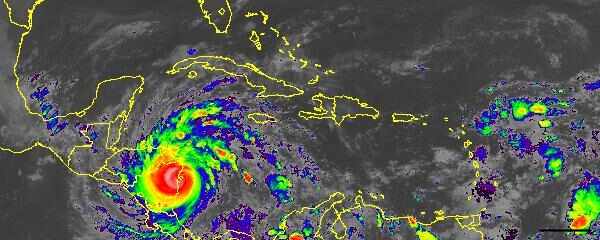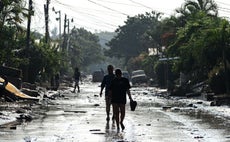
Heading to directly hit the Nicaraguan coast, Hurricane Iota strengthened this Sunday and its level is expected to increase even more. According to the National Hurricane Center in Miami, on Monday night that the hurricane makes landfall in northern Nicaragua. It could even go up to category 4.
The storm is following a similar course to that of Eta, which earlier this month left more than 200 dead and 2.5 million affected by floods and mudslides in Central America. For now, its advance in the Caribbean continues to generate an indirect impact from Colombia to Costa Rica.
“We will start the week immersed in the great flow of humidity that this system is generating,” said Gabriela Chinchilla of the National Meteorological Institute. According to Chinchilla, the country continues to receive cloud cover and isolated rains. The effects of Iota will be felt in the country at least until Wednesday.
Alert for Iota in Costa Rica
The National Emergency Commission (CNE) updated the alerts from this weekend to the possible effects of Iota. As the authorities have explained, there is a concern because the passage of Hurricane Eta left conditions of vulnerability. Saturated soils, swollen rivers, and unstable slopes are among the threats.
The chief of operations of the CNE, Sigifredo Pérez, explained that the main affectation this Sunday was in the Central Valley and that person has been sent to the Central and South Pacific to accompany the municipal committees. Pérez added that supplies have been arranged in case they are needed and that there are still 99 people sheltered due to Hurricane Eta.
Potentially catastrophic
The National Hurricane Center has warned that heavy rains from Iota could cause flash floods and river flooding in Central America and northern Colombia. “The floods and landslides in Honduras and Nicaragua could be exacerbated by the recent effects of Hurricane Eta” with a “potentially catastrophic impact,” said the US center.
Throughout Central America

The Nicaraguan meteorological authorities anticipate that the new hurricane will impact between Cabo Gracias a Dios, on the border with Honduras, and Prinzapolka, further south, near the city of Bilwi. It is a town of more than 40,000 inhabitants, most of them indigenous Miskitos and Afro-descendants.
In Honduras, police and the military evict tens of thousands of residents in boats in the Sula Valley, near San Pedro Sula. This is the second city in the country, 180 km north of Tegucigalpa, in the face of imminent floods.
The Permanent Contingency Commission (Copeco) warned in a statement that the proximity of Iota “increases the risk of floods and landslides, especially in the areas that were impacted by Eta.
“Guatemala, which suffered fatal landslides with the Eta pass, expects heavy rains from next Tuesday. Panama declared this Sunday a red alert in the western provinces of Chiriquí and Bocas del Toro and in the Ngäbe-Buglé indigenous region, in which Eta left 19 dead, 12 missing and millions in losses, according to civil protection.
Effects of Climate change
Climate change produces an increase in temperature in the surface layers of the oceans. This generates more powerful and water-filled hurricanes and storms, which pose a more dangerous threat to coastal communities. This is indicated by studies by the Intergovernmental Group of Experts on Climate Change (IPCC). The record number of hurricanes this year forced the use of the Greek alphabet to name the new cyclones.


